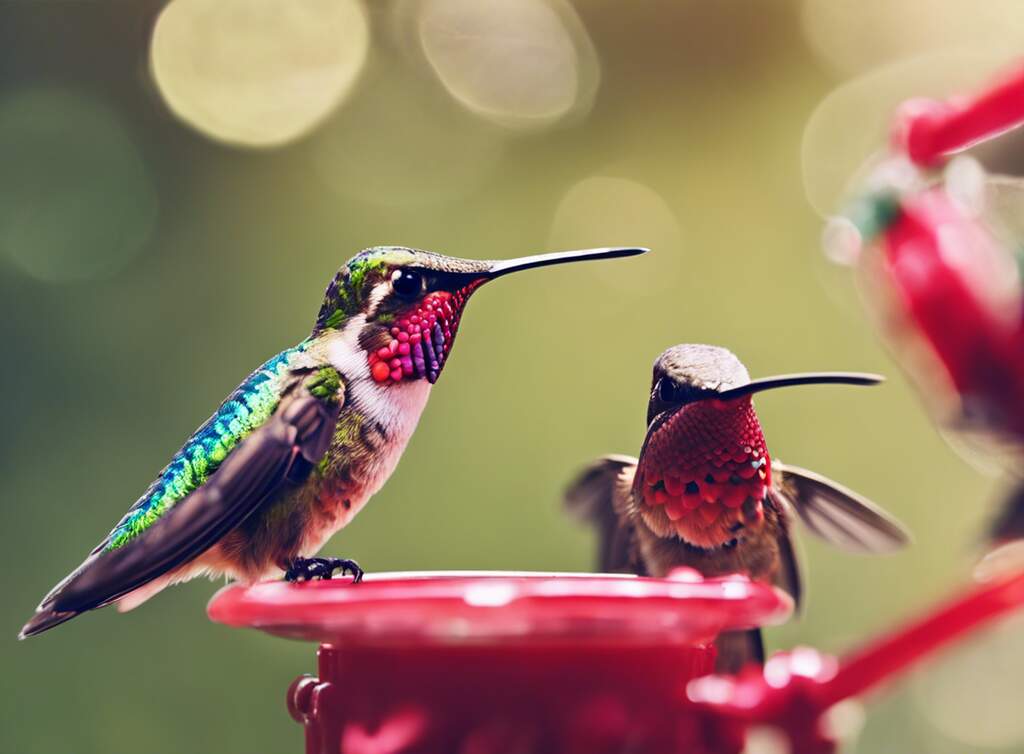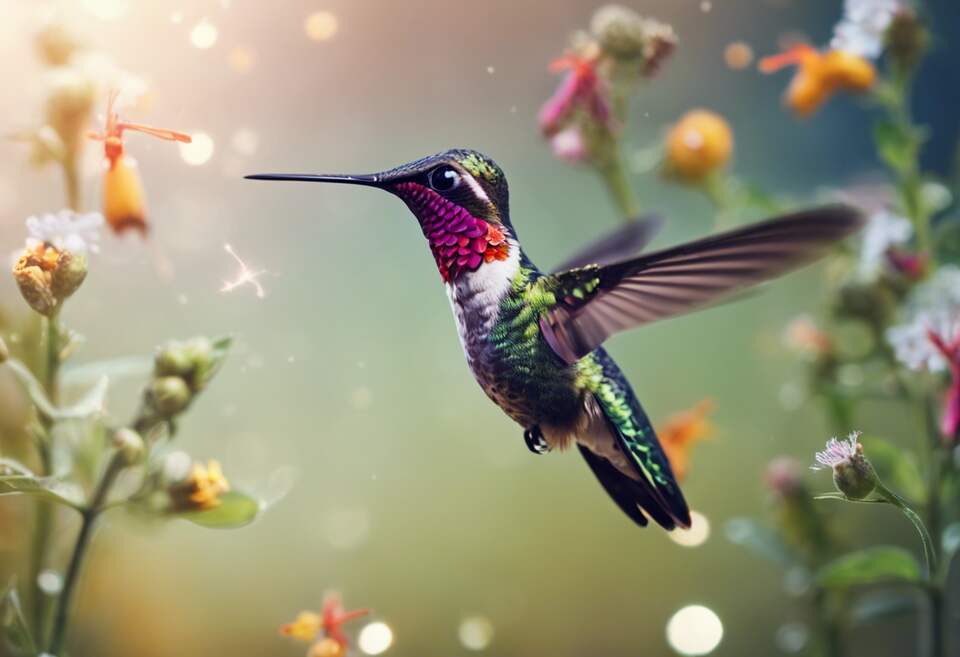Hummingbirds, known for their vibrant colors and extraordinary flying abilities, are fascinating creatures that capture the hearts of many nature enthusiasts. A common question that intrigues birdwatchers and wildlife enthusiasts is whether hummingbirds eat bugs as part of their diet. Let’s dive into the dietary habits of these tiny, yet mighty birds to uncover the truth behind the question: do hummingbirds eat bugs?
Table of Contents
The Diet of Hummingbirds: Do Hummingbirds Eat Bugs?
Understanding the Diet of Hummingbirds
Hummingbirds have a unique dietary requirement due to their high energy needs. While nectar from flowers is their primary food source, providing them with the necessary sugars for energy, hummingbirds also supplement their diet with other sources of nutrients, including insects. Insects offer vital proteins and fats that nectar alone may not provide in sufficient quantities to support the hummingbirds’ active lifestyle.
The Role of Bugs in a Hummingbird’s Diet
Bugs play a crucial role in a hummingbird’s diet as they offer essential nutrients that aid in maintaining their overall health and well-being. Hummingbirds are known to feed on a variety of insects, including mosquitoes, gnats, fruit flies, and spiders. These insects are excellent sources of protein and other essential nutrients that help hummingbirds thrive.
Hunting Techniques of Hummingbirds
Hummingbirds are adept hunters, utilizing their agility and speed to catch insects in flight or pluck them from leaves and branches. They use their long, slender bills to snatch insects out of the air with precision and skill. Additionally, hummingbirds may also pick insects off flowers or spider webs to supplement their diet with these protein-rich snacks.
Benefits of Bugs in a Hummingbird’s Diet
Including bugs in their diet offers several benefits to hummingbirds. Insects provide essential amino acids that are necessary for muscle development and maintenance. Furthermore, bugs are rich in fats that offer a high-energy food source, crucial for powering the intense metabolism and rapid wingbeats of hummingbirds.
A Balanced Diet for Hummingbirds
While bugs are a valuable source of nutrients for hummingbirds, they do not solely rely on insects for sustenance. Nectar remains a primary component of their diet, providing the sugars needed for quick bursts of energy. By combining nectar with insects, hummingbirds maintain a balanced diet that supports their demanding lifestyle.
Attracting Hummingbirds to Your Garden
If you wish to attract hummingbirds to your garden, consider planting a variety of nectar-rich flowers like trumpet vine, bee balm, and salvia. Additionally, incorporating insect-attracting plants can provide natural sources of bugs for hummingbirds to feed on. Creating a welcoming habitat that offers both nectar and insects can help draw these delightful birds to your outdoor space.
Hummingbirds do eat bugs as part of their diet, supplementing their nectar intake with protein and fats essential for their health and energy requirements. By understanding the importance of bugs in a hummingbird’s diet and creating a habitat that supports their nutritional needs, you can enjoy the presence of these remarkable birds in your surroundings.
Effective Tips for Attracting Hummingbirds to Your Garden
Hummingbirds are fascinating creatures known for their vibrant colors, remarkable agility, and unique feeding habits. One common question that often arises among nature enthusiasts is, “do hummingbirds eat bugs?” Let’s delve into this topic to gain a better understanding of the dietary habits of these tiny birds.
Understanding Hummingbird Diets and Nutrition
Hummingbirds are primarily nectarivores, meaning they primarily feed on the nectar of flowers. Their long, slender bills are perfectly adapted for sipping nectar from tubular flowers. However, nectar doesn’t provide all the essential nutrients these energetic birds need to thrive. To supplement their diet, hummingbirds also consume insects, spiders, and other small arthropods.
Do Hummingbirds Eat Bugs?
Yes, hummingbirds do eat bugs. Insects are a crucial source of protein for hummingbirds, especially during the breeding season. By capturing small insects and spiders, hummingbirds supplement their nectar-based diet with essential proteins, vitamins, and minerals. Bugs also provide fats and amino acids that are vital for the birds’ growth, development, and overall health.
Types of Bugs Hummingbirds Eat
Hummingbirds have a diverse diet when it comes to bugs. They feed on a variety of insects, including mosquitoes, gnats, fruit flies, beetles, ants, aphids, and leafhoppers. Additionally, hummingbirds have been observed catching spiders for a quick protein boost. These tiny arthropods not only provide essential nutrients but also help hummingbirds maintain their energy levels for their fast-paced lifestyle.
How Hummingbirds Catch Bugs
Hummingbirds are agile aerial hunters that employ various techniques to catch bugs. With their excellent eyesight, these birds can spot tiny insects from a distance. Once a potential prey is detected, a hummingbird will dart towards it with remarkable precision and speed. Their long, extendable tongues allow them to capture insects swiftly, delivering a quick and efficient meal on the go.
The Importance of Bugs in Hummingbird Gardens
For individuals looking to attract hummingbirds to their gardens, providing a diverse food source is essential. While nectar-rich flowers are a great start, incorporating bug-attracting plants can further entice hummingbirds to visit regularly. Bugs not only offer nutritional benefits to hummingbirds but also stimulate their natural foraging behaviors, keeping them active and healthy.
While hummingbirds primarily feed on nectar, their diet is not limited to just sugary fluids. Bugs play a crucial role in supplementing the nutritional requirements of these remarkable birds. By understanding and appreciating the role of bugs in a hummingbird’s diet, you can create a welcoming environment that not only attracts but also sustains these delightful creatures in your garden. Remember, to truly appreciate the beauty of hummingbirds, it is essential to embrace their natural dietary habits, bugs and all.
Conclusion
In understanding the diet of hummingbirds, particularly the question of whether hummingbirds eat bugs, we have unraveled an intriguing aspect of these captivating creatures. While nectar often serves as their primary source of energy, insects play a vital role in providing essential proteins and nutrients necessary for their survival and well-being. By consuming insects, hummingbirds balance their nutritional intake and enhance their overall health. This dual dietary nature showcases the fascinating adaptability and efficiency of hummingbirds in optimizing their diets to meet their specific needs.
Moving beyond their dietary habits, attracting hummingbirds to your garden can be a fulfilling and rewarding experience. By incorporating effective strategies and tips such as planting native flowers, providing fresh nectar, offering perches, and maintaining a clean feeding area, you can create an inviting environment that entices hummingbirds to visit regularly. Moreover, incorporating bright colors, using audible cues like wind chimes, and ensuring a water source further enhance the appeal of your garden to these delightful visitors. By implementing these practices thoughtfully, you can create a welcoming habitat that not only attracts hummingbirds but also supports their well-being.
By understanding the intricacies of hummingbirds’ diets and implementing strategies to attract them to your garden, you can foster a harmonious relationship with these remarkable creatures. Observing them darting gracefully from flower to flower, savoring nectar and diligently hunting for insects, offers a glimpse into the incredible world of hummingbirds. Their presence brings vibrancy and life to any garden, enriching the natural landscape with their aerial acrobatics and melodious chirps. Through a blend of knowledge, patience, and dedication, you can create a sanctuary that not only nourishes hummingbirds but also nourishes your soul with joy and wonder.
The enchanting world of hummingbirds offers a wealth of learning opportunities and joys for those willing to delve into their fascinating realm. By exploring the nuances of their diet, including their consumption of bugs, and by employing best practices to attract them to your garden, you open the door to a realm of natural beauty and harmony. As you embark on this journey of discovery and appreciation, may the presence of hummingbirds in your life serve as a reminder of the delicate balance and interconnectedness of the natural world.
Embrace the wonder of these tiny, yet extraordinary, creatures, and let their presence enrich your days with their grace, resilience, and boundless spirit.



